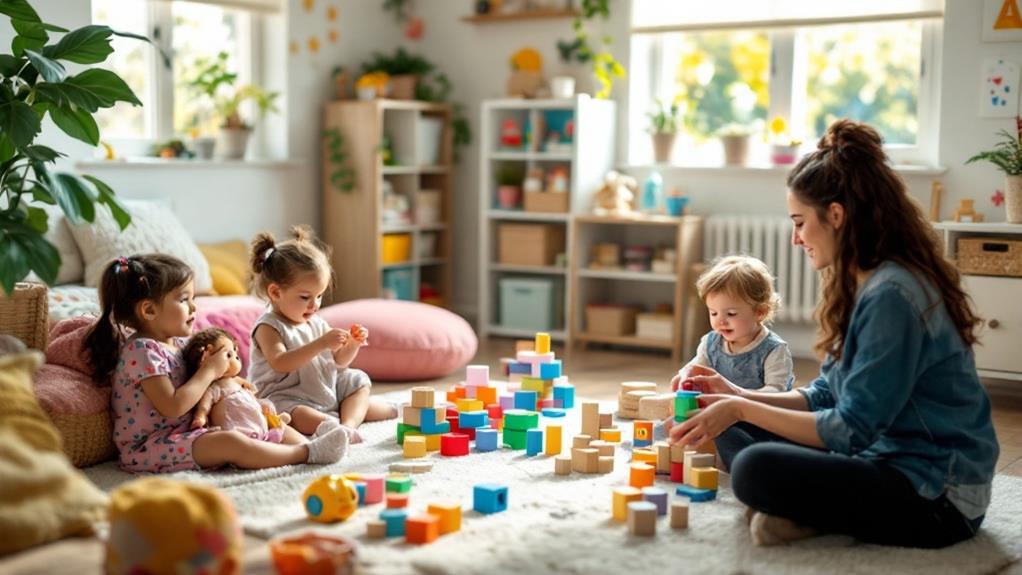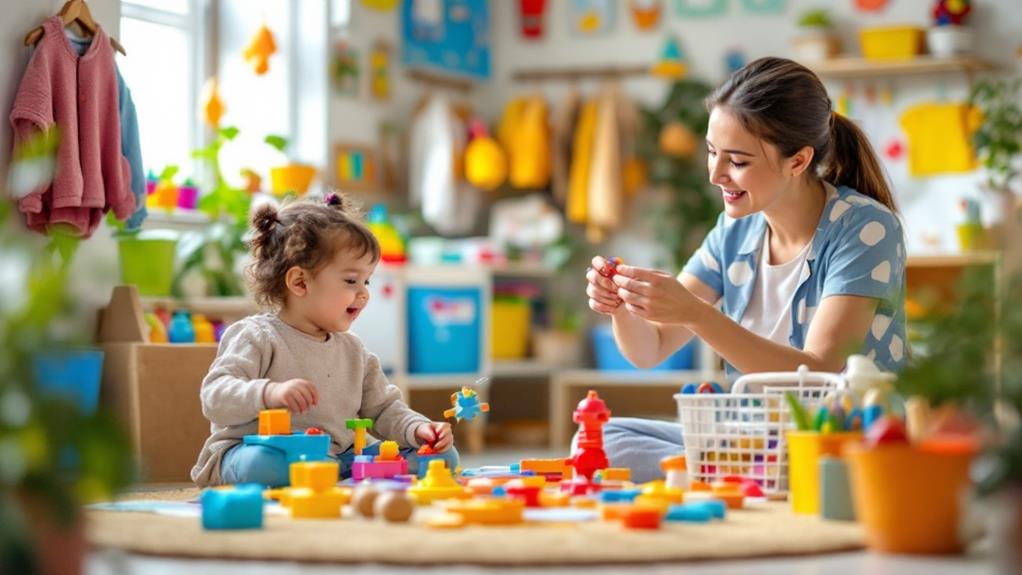Therapy is essential for helping your child gain crucial daily skills like dressing, eating, and communicating. Through Applied Behavior Analysis (ABA), positive reinforcement encourages progress and builds confidence. Occupational Therapy (OT) enhances fine motor skills, making tasks easier and more engaging. Meanwhile, Speech Therapy improves communication, aiding your child in expressing their needs effectively. Together, these therapies create a supportive environment that celebrates every small victory, fostering independence and self-esteem. As you explore how these approaches intertwine, you'll see the profound impact they can have on your child's everyday life.
Key Takeaways
- ABA therapy uses positive reinforcement to break down dressing, eating, and communication tasks into manageable steps for skill development.
- Occupational therapy enhances fine motor skills, making daily tasks like dressing and eating easier and more enjoyable for children.
- Speech therapy improves children's communication abilities, helping them articulate needs and connect with peers effectively.
- Integrating ABA, OT, and speech therapy provides comprehensive support, focusing on independence in daily living skills across various environments.
- Progress in functional skills is monitored regularly, celebrating small achievements to boost children's confidence and self-esteem.
Understanding Functional Skills

When you think about your child's journey, understanding functional skills becomes essential for their growth and independence. These skills—like dressing, eating, and communicating—are the building blocks for daily living. They empower your child to navigate the world confidently, fostering a sense of autonomy that can be deeply rewarding.
You might feel overwhelmed at times, especially when your child struggles with these tasks. But remember, every step forward, no matter how small, is a victory. Celebrate those moments, as they lead to significant milestones in your child's development.
By breaking down each skill into manageable steps, you can create a supportive environment that encourages practice and success. Incorporating functional skills into everyday routines not only helps your child learn but also strengthens your bond.
As you work together, you're not just teaching; you're building resilience and self-esteem. It's important to be patient and understanding, recognizing that progress varies for each child.
Ultimately, by focusing on functional skills, you're equipping your child with the tools they need to thrive in life. Your dedication and love will pave the way for their independence, nurturing their potential to flourish.
Overview of ABA Therapy
Building on the foundation of functional skills, Applied Behavior Analysis (ABA) therapy offers a structured approach to support your child's development. This evidence-based method focuses on understanding and modifying behavior to enhance daily living skills. With ABA, you'll see how positive reinforcement can encourage your child to engage in tasks like dressing, eating, and communicating effectively.
In your journey with ABA, you'll work closely with trained professionals who tailor interventions to meet your child's unique needs. They'll help identify specific goals, like mastering buttoning a shirt or requesting a snack, breaking down each task into manageable steps. This not only boosts your child's confidence but also fosters independence.
As you witness your child's progress, it's a demonstration of the power of consistency and encouragement. Celebrating small victories can transform everyday challenges into opportunities for growth.
With patience and dedication, you can create an environment where your child thrives, learning skills that will serve them for a lifetime. ABA therapy not only supports functional skills but also nurtures a sense of achievement, empowering your child to navigate the world with confidence and resilience.
Role of Occupational Therapy

Occupational therapy plays an essential role in helping children develop the skills they need for daily activities and overall independence. By focusing on tasks like dressing, eating, and self-care, occupational therapists empower kids to achieve their goals and embrace their individuality.
You'll witness firsthand how these therapists create engaging, tailored interventions that make learning feel like play.
As a parent or caregiver, you might notice your child struggling with buttons or using utensils. An occupational therapist steps in to break down these tasks into manageable steps, providing strategies to enhance their fine motor skills and coordination.
They'll encourage your child to practice these skills in a supportive, non-judgmental environment, celebrating each small victory along the way.
Moreover, occupational therapy fosters confidence and self-esteem. When children master skills that may have once felt overwhelming, they discover a newfound sense of independence.
This journey not only enhances their daily living skills but also nurtures resilience and adaptability.
Importance of Speech Therapy
As children gain confidence in their daily tasks through occupational therapy, another important area comes into play: communication.
Speech therapy is essential for helping children express their thoughts and needs effectively. When kids struggle with communication, it can lead to frustration and a sense of isolation. That's where speech therapy shines, providing them with tools to articulate their feelings and desires.
Imagine the joy on a child's face when they finally say what they want for lunch or share a funny story with friends.
Speech therapists work closely with children, using engaging techniques to develop vocabulary, enhance speech clarity, and improve social communication skills. This isn't just about talking; it's about connection and belonging.
Dressing Skills Development

When it comes to dressing skills, every small victory can empower a child and boost their confidence. Supporting children in developing these skills is essential, as it fosters independence and self-esteem.
Through Applied Behavior Analysis (ABA), Occupational Therapy (OT), and Speech Therapy, you can help a child navigate the journey of getting dressed.
ABA focuses on breaking down the dressing process into manageable steps, using positive reinforcement to encourage progress. This structured approach helps children understand each task, from putting on a shirt to fastening buttons.
OT complements this by enhancing fine motor skills, ensuring that a child can manipulate clothing effectively. Therapists may use adaptive tools to make dressing easier and more enjoyable.
Speech Therapy plays a significant role as well, encouraging children to express their needs during dressing. They might learn to communicate preferences, ask for help, or describe what they're wearing, enriching their social interactions.
Eating Skills Enhancement
Eating skills are fundamental for a child's growth and independence, and every meal can become a stepping stone toward self-sufficiency. Through Applied Behavior Analysis (ABA), Occupational Therapy (OT), and Speech Therapy, you can help children develop these essential skills. ABA focuses on positive reinforcement, encouraging children to try new foods and use utensils correctly, making mealtime a rewarding experience.
OT plays an important role in enhancing fine motor skills necessary for eating. Therapists can provide strategies and adaptive tools that make grasping utensils easier, allowing children to gain confidence and control. You might notice how simple adjustments, like using a fork with a thicker handle, can empower a child to feed themselves more effectively.
Moreover, even the sensory aspects of eating are addressed in therapy. By introducing varied textures and flavors gradually, children can become more open to trying different foods, reducing mealtime anxiety.
Ultimately, fostering eating skills not only nurtures a child's nutritional needs but also opens doors to social interactions and independence. Remember, every bite they take brings them closer to a more self-reliant future, and your support is invaluable in this journey.
Communication Skills Improvement

Effective communication is the cornerstone of a child's social development and emotional well-being. When you support children in enhancing their communication skills, you're opening doors to meaningful interactions and relationships.
Through services like Applied Behavior Analysis (ABA), Occupational Therapy (OT), and Speech Therapy, you can help children express themselves more effectively and understand others better.
ABA focuses on reinforcing positive communication behaviors, helping children learn through structured interactions. You'll see how small successes can build their confidence, encouraging them to engage more with peers.
OT plays an essential role by addressing the physical skills needed for communication, ensuring children can use their voices and bodies to convey messages.
Speech Therapy directly targets language development, using tailored strategies to improve articulation, vocabulary, and comprehension. You'll witness transformations as children gain the ability to express their thoughts and feelings, making them feel more connected to those around them.
Conclusion
Incorporating ABA, occupational, and speech therapy into your child's routine is like planting seeds in a garden; with care and nurturing, they'll blossom into essential skills that enrich daily life. These therapies work hand in hand to empower your child, helping them master dressing, eating, and communicating with confidence. As you witness their growth, remember that every small step taken is a leap toward independence, paving the way for a brighter, more fulfilling future.
